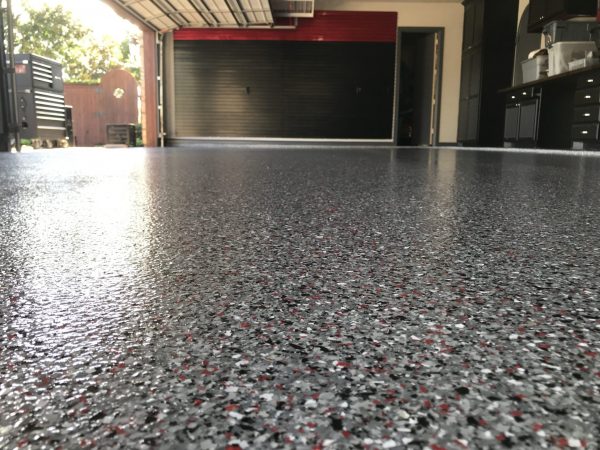Epoxy coatings have become a popular flooring solution for homeowners and businesses alike. Whether you are upgrading your garage, basement, or commercial space, epoxy offers durability, aesthetics, and ease of maintenance that traditional flooring cannot match. However, with so many options available, you may be wondering if epoxy flooring is the right choice. This guide will answer the most common questions about epoxy coatings to help you make an informed decision.
1. What Is Epoxy Coating and How Does It Work?
Epoxy coating is a resin-based flooring solution that creates a durable, glossy, and seamless surface over concrete floors. It consists of two main components:
- Epoxy Resin – Provides adhesion, toughness, and chemical resistance.
- Hardener (Curing Agent) – Reacts with the resin to form a solid, protective layer.
Once applied, the mixture hardens into a non-porous, resilient surface that can withstand heavy foot traffic, vehicle movement, chemicals, and moisture.
Common Applications:
- Garage floors
- Basements
- Commercial kitchens
- Warehouses
- Retail stores
2. What Are the Benefits of Epoxy Coating?
Epoxy flooring is one of the most durable and cost-effective flooring solutions available today.
Durability
Epoxy floors can withstand heavy loads, impact, and abrasion. They are resistant to cracks, chips, and general wear over time.
Chemical and Stain Resistance
Epoxy coatings protect against oil, gasoline, bleach, and household chemicals, making them ideal for garages and workshops where spills are common.
Water and Moisture Resistance
The waterproof properties of epoxy prevent water damage and mold growth, making it a good choice for basements and commercial spaces.
Low Maintenance
Epoxy floors are easy to clean due to their smooth, non-porous surface, which resists dirt and bacteria buildup. Routine cleaning requires only mild soap and water.
Aesthetic Appeal
Epoxy coatings come in a variety of colors, metallic finishes, and decorative flakes, allowing customization to match different styles and preferences.
3. How Long Does Epoxy Flooring Last?
The lifespan of epoxy flooring depends on factors such as the quality of materials used, surface preparation, and maintenance.
- Garage floors typically last between 10 to 20 years.
- Commercial spaces can last more than 10 years with proper upkeep.
- Industrial settings may require resurfacing after 5 to 10 years due to heavy traffic.
To extend the life of an epoxy floor, it is important to follow proper cleaning and maintenance practices.
4. What Are the Different Types of Epoxy Coatings?
There are several types of epoxy coatings, each suited for different applications.
100% Solid Epoxy
This is the most durable and long-lasting option, ideal for industrial, commercial, and high-traffic areas. It requires professional installation due to its thickness and rapid curing process.
Water-Based Epoxy
This option is easier to apply but less durable than solid epoxy. It is commonly used for residential applications and low-traffic areas.
Solvent-Based Epoxy
Solvent-based epoxy offers strong adhesion and chemical resistance but emits strong odors during application, requiring proper ventilation. It is used in commercial and industrial spaces.
Metallic Epoxy
Metallic epoxy creates a unique, three-dimensional, marble-like effect. It is often used in showrooms, offices, and luxury spaces. Professional installation is recommended for the best results.
Epoxy Flake Flooring
This type of epoxy incorporates decorative vinyl flakes to add texture and slip resistance. It is commonly used in garages, warehouses, and sports facilities.
5. What Causes Epoxy Coating to Fail?
Epoxy coatings may fail when not applied correctly. Some of the most common reasons include:
Improper Surface Preparation
Concrete must be clean, dry, and free of oil and debris before applying epoxy. Grinding or etching the surface is necessary for proper adhesion.
Moisture Issues
High moisture levels in the concrete can cause bubbling, peeling, or delamination of the epoxy coating. A moisture barrier may be needed in basements or humid areas.
Incorrect Mixing or Application
Improper resin-to-hardener ratios can result in weak or sticky floors. Uneven application can also lead to visible imperfections.
Temperature and Humidity Problems
Epoxy should be applied in temperatures above 50°F (10°C). High humidity can interfere with curing and adhesion, leading to defects in the final finish.
Hiring a professional epoxy contractor can help prevent these issues and ensure a long-lasting floor.
6. How Much Does Epoxy Flooring Cost?
The cost of epoxy flooring varies based on factors such as square footage, the type of epoxy used, and installation complexity.
Estimated Costs:
- Basic epoxy coating: $3 to $7 per square foot
- Metallic epoxy: $8 to $12 per square foot
- Epoxy flake flooring: $5 to $10 per square foot
- Industrial-grade epoxy: $10 to $15 per square foot
Factors That Affect Cost:
- Surface preparation, including grinding, repairs, and moisture barriers
- The number of epoxy layers applied
- Customization options such as decorative flakes or metallic finishes
While DIY epoxy kits are available, professional installation ensures durability and prevents costly mistakes.
Is Epoxy Coating the Right Choice for You?
Epoxy flooring is an excellent option for homeowners and businesses looking for a long-lasting, high-performance surface. It offers durability, easy maintenance, and a modern aesthetic that enhances the appearance of any space.
Epoxy Coating Is a Good Choice If:
- You want a durable flooring solution that withstands heavy use.
- You need a low-maintenance, stain-resistant surface.
- You want a customizable floor with various color and design options.
- Your space requires a waterproof and chemical-resistant floor.
Consider Other Options If:
- You prefer a soft, cushioned surface such as carpet or vinyl.
- You want natural materials like wood or stone.
- Your concrete has excessive moisture problems that cannot be addressed with a moisture barrier.
For those considering epoxy flooring, consulting a professional like Gramer Flooring can help ensure a smooth installation and long-lasting results!
